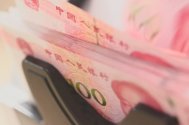Yuan rapidly gaining ground as Chinese firms plot global expansion
Yuan’s use in cross-border payments rose 14 per cent year on year to 35 trillion yuan (US$4.9 trillion), according to the People’s Bank of China

Chinese companies expanding overseas are increasingly using the yuan for financing and payments to build their international operations, boosting the currency’s growing clout in international trade and investment.
“Based on my calculation, 10 per cent of our company’s total orders were priced and settled in renminbi,” said Yang Feng, finance director for overseas marketing at Sieyuan Electric, in a panel discussion organised by Standard Chartered at the China International Import Expo in Shanghai on November 7. The details of the panel discussion were posted on the bank’s official WeChat account on Friday.
He added that most Chinese companies that have business partnerships with Sieyuan “are often each other’s suppliers or customers, giving both sides a strong incentive to settle transactions in yuan”.
Shenzhen-listed Sieyuan Electric, which designs, manufactures and sells power transmission and distribution equipment, has operations in many countries, including the UK, Italy, Saudi Arabia and Kuwait.
In the first six months of the year, the use of the yuan in cross-border payments totalled 35 trillion yuan (US$4.9 trillion), up 14 per cent from a year earlier, according to the People’s Bank of China.
Yang said the willingness of the company’s non-Chinese clients to settle in yuan was highest among countries involved in the Belt and Road Initiative, such as Pakistan, Thailand and Malaysia, Saudi Arabia, Uzbekistan and Kazakhstan.
“Renminbi internationalisation is advancing quickly,” he said. “As more Chinese firms go global, the use of renminbi will naturally rise. The renminbi offers notably competitive interest rates right now, which is a major factor in reducing our financing costs.”
China held its one-year loan prime rate, the benchmark for lending to companies, at 3 per cent and five-year rates at 3.5 per cent for the fifth consecutive month in October, while US dollar borrowing costs hover around 4 per cent.
Universal Energy, a 10-year-old renewable energy developer based in Shanghai, is another company capitalising on favourable yuan financing costs. In July, the company borrowed 256 million yuan from Industrial and Commercial Bank of China and Bank of China to fund a 100-megawatt wind power project in Kazakhstan.
The yuan had become the world’s third-largest trade finance currency, trailing only the US dollar and the euro at the end of last year, according to a report published by the China Banking Association.
Standard Chartered is betting on the yuan’s growing role in international trade, making the currency a key part of the bank’s strategy.
“We leverage Hong Kong as the world’s largest offshore renminbi centre to successfully help clients utilise renminbi as a financing currency, especially for trade finance,” said Karen Ng, managing director and head of China opening and yuan internationalisation at Standard Chartered, during the same panel.
The lender has benefited from Hong Kong’s upgraded Renminbi Business Facility, launched in October, which allows banks in the city to offer their clients access to one-year funding at the onshore yuan rate. The removal of the previous 25-basis-point spread has made yuan borrowing more cost effective for companies.
Apart from financing, Chinese companies are using the yuan for cross-border investments to reduce currency risks.
Cobalt miner and lithium-battery maker Zhejiang Huayou Cobalt has adopted the yuan for its investments in Indonesia, with its Indonesian subsidiary using the funds to buy equipment from Chinese exporters.
The move reduces the company’s dependency on the US dollar and avoids foreign exchange risks, according to vice-president Qian Xiaoping.
Standard Chartered analysts expect the Chinese government to promote greater use of the yuan in international transactions, including with countries involved in the Belt and Road Initiative and in commodity pricing.
“We expect China to further relax controls on capital flows, removing most restrictions on cross-border lending, foreign direct investment and securities investment to accelerate yuan’s internationalisation,” the analysts said in a report on November 6.

